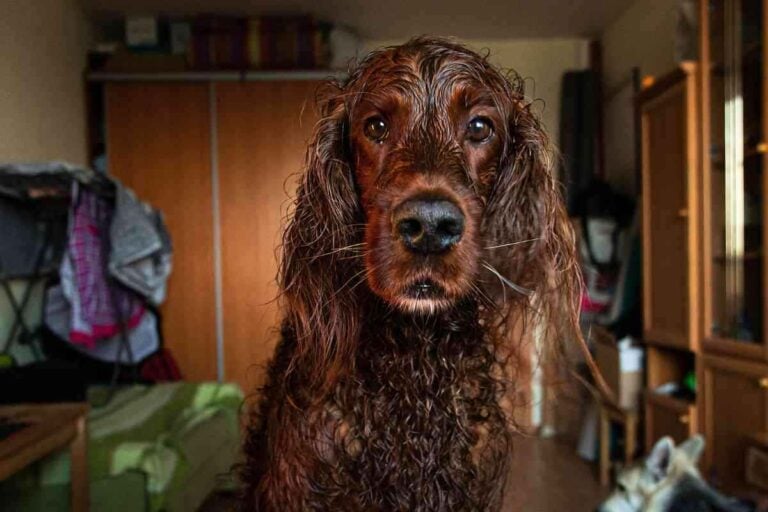Are Havanese Dogs Yappy? 4 Reasons Yours Won’t Stop Barking
Some people can handle a dog that barks at everything in the world around them no matter what time of day it is. However, a yappy dog can cause a lot of annoyance and frustration to owners or even apartment neighbors. Knowing how loud a breed is can be the difference between a new family member or not for some families.

Are Havanese Dogs Yappy?
The Havanese dog isn’t too loud. They aren’t yappy, but they will occasionally bark at someone passing by. This makes them good dogs for both the large house and the small apartment.
Most dogs bark, and this includes the Havanese dog. There are common triggers that many dogs have that will cause them to start shouting and talking to whatever their target is.
Stranger Danger
This is a super common reason for any dog to bark, no matter what kind of housing situation you have. If a stranger passes by a window or comes up to your door, you can expect your Havanese dog to show this stranger what they’ll be dealing with if they mess with you.
Dogs, including Havanese dogs, are protective over their owners. They will do anything that they can to make sure that their families are safe and protected. This means that they will bark at anything that they perceive to be a threat.
A Scary Situation
If your Havanese gets scared, it might start barking at the trigger. A good example is thunder during a storm. Some dogs will yelp and whine when they hear a loud crash of thunder, but other dogs might start barking at the offending noise.
If your dog is scared of the vacuum, you will likely see them barking at it when you’re cleaning the house.
They Are Lonely
Havanese dogs love their owners to the point when they can be overly attached. These dogs are susceptible to separation anxiety and will get very upset when their owners leave for any amount of time. In a lonely situation, your neighbors may note barking from your dog.
Barking is how these dogs show that they are not happy with you leaving and want you back in the house immediately. If your Havanese dog barks whenever you leave the house, then that’s a pretty good indication that your dog has separation anxiety.

The Hunting Instincts Kicking In
Most dogs have a hunting instinct from the time when they were first bred. Even the Havanese dog has a hunting instinct.
For the houses that have many windows that give an amazing view of a backyard or a nearby forest, your Havanese dog might love looking out it. If they spot prey nearby, whether that be a squirrel or any other small creature, your Havanese dog will start barking at it. They will also bark if they are outside but can’t reach the small creature in question.
What Does a Havanese Bark Sound Like?
It has already been discussed that the Havanese dog doesn’t have a yappy bark, but what does their bark sound like?
The size of the Havanese dog is misconceiving, as they don’t have the same high-pitched bark that many other small dogs have. Instead, these dogs have a slightly deeper and louder bark. If these dogs loved to bark more than they do, this loud and deep bark might become a problem for some owners.
Can I Get My Havanese Dog to Stop Barking?
Maybe you have a very vocal Havanese or maybe your house has a lot of passersby. No matter the reason why your Havanese dog is barking more than you want, there are ways to lessen the barking.
Now, you won’t be able to eradicate barking from your Havanese behavior. Barking is just something that every dog does at some point. It is unlikely that you’ll be able to stop your Havanese dog from barking due to fear or a stranger knocking at the door, but you can help with other reasons for barking.
Barking From Separation Anxiety
In the case of separation anxiety, training to get your dog to stop barking will look a bit different. To start, you won’t be at the house to train your dog not to bark when you leave. Also, you will have to focus on the root of the cause instead of just the barking.
When your dog has separation anxiety, you have to get your dog used to you being gone for different amounts of time. One solution to separation anxiety is by having another Havanese in the house so your Havanese isn’t lonely, but this is more prevention than a cure.
Start small, practice the small steps to leaving the house. If your dog is getting anxious after you grab your bag and shoes, go through the motions with your dog a few times. Every time that you get ready to leave and your Havanese is calm, give it a treat. Then practice being gone for short amounts of time and give a treat when you come back.
Listening neighbors can be really helpful here. They can let you know how much your Havanese has barked in the time you were gone.
Give your Havanese a treat whenever you come home and slowly leave for longer amounts of time. However, don’t be gone for more than a few hours so that you don’t neglect their needs.
Another way to help separation anxiety is by giving your Havanese dog plenty to do while you’re gone, like toys or a bone. The distraction can help.
Training Out Unwanted Barking, Start by Ignoring
Now, when dealing with barking due to people walking by the house or because your dog is upset at something, the best way to start is by ignoring the barking. Many times, people accidentally train their dogs into doing unwanted behavior because they give their dogs attention during it. Giving your dog pets while it is barking ends up teaching them that barking is a wanted behavior when it isn’t.
When you notice your dog barking, don’t pay attention to the behavior. Wait until they are done barking to give them attention again. During this, you can also start a command. A good word to use as a command is “quiet” that you can teach your Havanese to listen to.
Using the Command
When your Havanese is barking, say “quiet” and wait until the barking stops. At this point say the command again and give your dog a treat. Do this every time your dog starts to bark. Repeating the command and giving a treat with every training session.
You must be persistent in this. Telling to be quiet one time and giving them pets the other time can confuse your Havanese dog and make it more difficult to learn the command. Don’t send mixed signals.
After a few times of practicing this command, test your dog. Stop saying “quiet” for the second time and just give your Havanese dog a treat when they quiet down. Note the amount of time it takes to stop barking after you give the command. If the time is very short, then you have successfully trained the “quiet” command in your dog. At this point, you shouldn’t have to use the treat incentive anymore.
This training method will take time, especially since you need your dog to bark to practice the command. Don’t get discouraged if training is taking longer than you expected. You will need determination and patience to teach a completely new command and for your Havanese dog to fully learn it.
Keep in mind that this command might not work for barking from fear and anxiety. In the case of fear, it is best to comfort your dog so that it can feel better.
Final Thoughts
Havanese dogs are great for apartments or quiet neighborhoods. They aren’t one of those other small dogs that always seem to yap and yap without stop. The bark of these dogs is both deeper and louder, but also not as frequent. Don’t expect your Havanese dog to get into a barking fit often if there isn’t a good trigger for it.
Havanese dogs will bark for a few reasons, which are the same reasons that many breeds will bark at. Stranger danger, nearby prey, fear, and loneliness are all reasons why your Havanese dog might start to bark.
If the barking that your Havanese dog does is still too much for you, there are ways to train out some of the behavior. However, you won’t be able to completely take away their bark, as barking is an instinct for many dogs. Training will take time and determination so don’t expect your Havanese to be a quiet angel right away.
Havanese dogs, no matter how much or little they bark, are still amazing dogs to have in your family. They are super loving and love all the attention that they can get from their owners. They are a true companion dogs to everyone in your family.






